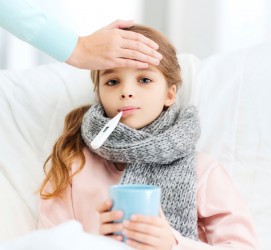 Yep, as they say, it’s that time of the year, AGAIN. Aaaah CHOO! Cough cough. Sputter sputter. Deep smoker’s voice. A small pharmacy of meds lined up on your dresser! If you’re like us, you may have already suffered through the back-to-school crud, and would just as soon avoid any mention of the flu altogether. To get the 411 on this year’s upcoming flu season, we interviewed Dr. Ashwin Jathavedam, MD, Infectious Disease Specialist at Englewood Hospital and Medical Center.
Yep, as they say, it’s that time of the year, AGAIN. Aaaah CHOO! Cough cough. Sputter sputter. Deep smoker’s voice. A small pharmacy of meds lined up on your dresser! If you’re like us, you may have already suffered through the back-to-school crud, and would just as soon avoid any mention of the flu altogether. To get the 411 on this year’s upcoming flu season, we interviewed Dr. Ashwin Jathavedam, MD, Infectious Disease Specialist at Englewood Hospital and Medical Center.
So, when does flu season start?
Flu season typically runs from late September through end of April. You can expect to get six months of immunity from the vaccine, which is why we recommend that people get their flu shot as early into the season as possible.
Why is there a ‘season’ for flu? Does the virus dry up in summer?
While the virus is around year-round, the transfer is enhanced in colder weather. A lot has to do with the temperature change. The virus itself becomes more transmissible. We’re also indoors more. Put those things together, and you get a good environment for the virus to transmit between individuals.
Is this year’s vaccine effective?
We actually won’t know until after the fact. In putting together the vaccine, the CDC looks at data all over the world, and has to make a decision pretty early. Even with all of last year’s bad press about the variation in the strain, those who received the vaccine still got some benefit.
What would you say to people who don’t want the flu shot or think it’s not for them?
The number one fallacy is thinking you can get sick from the flu shot. It’s tempting to place the blame if you suddenly get the sniffles a week later, but those viruses did not come from the flu shot. Biologically, the injection is inactive. For people who are healthy, I make the appeal to get the flu shot so you can protect others that are most at-risk: Pregnant women, cancer patients, the elderly, babies, and anyone with chronic conditions like asthma, heart disease, or COPD. These populations need to be protected.
Mist or shot?
Both are equally effective. Mist is geared more for kids, though there are some restrictions if the child has asthma or lung disease. There is also some slight variance of cost, depending on where you get the vaccine and what your health plan will cover.
Overall, what should parents know? The message I most want to get across is that the vaccine is very safe. There’s no reason not to get it. From drugstores to schools to the doctor’s office, there are many places where you can easily and conveniently get the vaccine, including some clinics where you don’t have to pay at all.





